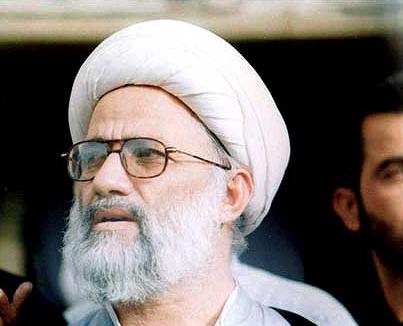Ayatollah Yaqubi Demands Khalilzad’s Expulsion
Maliki: “US Will Destroy Iraq”
Mortar shells, bombings and assassinations killed 9 in Iraq on Friday, in Baghdad and Kirkuk. A US soldier was killed in Anbar Province.
Some prominent Shiite clerics used their Friday sermons to call for the expulsion from Iraq [Ar.] of US ambassador Zalmay Khalilzad. They have begun to see Khalilzad, a Sunni Pushtun, as too close to Sunni Iraqis and as anti-Shiite. I’m told they have started calling him “Abu Umar,” a reference to the second Sunni Caliph, whom Shiites deride as a usurper of the office that rightfully belonged to Imam Ali, the Prophet’s cousin and son-in-law.
Ayatollah Muhammad Ya`qubi is the spiritual guide for the Virtue (Fadhila) Party, which has 15 seats in the federal parliament and controls the provincial council of Basra. He described Khalilzad as “a sectarian who favors the Sunnis” and said that his statements “lack veracity and objectivity.” He called on the Bush administration not to submit to the terrorists nor to fall into the snares of the sectarians and haters. He said that if the administration “wants to protect itself from failure and collapse, it must change its ambassador in Iraq.”
Ayatollah Muhammad Yaqubi (courtesy KarbalaNews.net)
KarbalaNews.net reports that Ya`qubi accused Washington of underestimating the seriousness of the bloody struggle between the Shiite majority and the Sunni Arab minority who have been deposed from their sovereignty over the country.
In a communique from his offices in Najaf, Yaqubi said, “American administration figures have denied the existence of a sectarian war in Iraq. They are either misguided by statements lacking in objectivity and truthfulness sent back by the sectarian American ambassador in Iraq and his like, or they are deliberately denying this reality for more than one reason.”
Ya`qubi said that the American ambassador and “the tyrants” of the Arab states are giving political support to those quarters that offer political cover. He warned Washington not to fall for the misrepresentations of the terrorists.
When Ya`qubi’s follower, a preacher at the Rahman mosque in Baghdad, read out these phrases, the congregation erupted with shouts of “God is Most Great!”
He said there were several possible reasons for which the Bush administration might want to deny the obvious outbreak of sectarian warfare in Iraq:
1. They don’t want to admit their failure in Iraq for fear of damaging the reputation of the United States, and want to convince themselves and others that they have succeeded in protecting Iraqi citizens from tyranny, oppression, killing and expropriation, and have founded a true democracy in Iraq.
2. They are buying time in hopes of implementing their plans for sidelining the Shiite majority
3. Recognizing the true situation would force them to attempt to resolve it, which they do not want to do or are unable to do.
He said he could not understand how the Americans explain the dozens of innocents that show up dead every day in the streets and markets and elsewhere, for no other reason than that they are Shiites, if they are not victims of a sectarian war. How else to explain the destruction of holy shrines and the killing of pilgrims? How else to explain the mass expulsions of populations, affecting thousands of families, who have been threatened with death. If this massive displacement of people was going on anywhere else in the world, he said, it would be widely decried. But Shiites in Iraq getting kicked out of their homes in the thousands? Silence. He claimed that the number of persons killed in Iraq exceeds all the deaths in the Lebanese Civil War 1975-1989 (if he is taking the 100,000 figure suggested in Lancet, he is correct). If this is not a civil war, he asked, what is?
Ya`qubi said that most Sunnis and Shiites don’t want to fight, but are being coerced into it by threats of violence from Saddmists and excommunicators. He lamented that the general Sunni Arab community does bear some responsibility here, since it gives refuge to these terrorists rather than turning them in. Where is the Arab solidarity of which they boast? In contrast, Sunni Arabs live safely in Shiite districts, he alleged.
He said that some (Sunni Arab) elements with ties to the terrorists have been unwisely admitted to the political process, under American pressure.
It has now ended, he said, with the so-called “national security council,” which is unconstitutional and a revolution against the democratic process, taking away the prerogatives of the elected majority.
Al-Hayat: Ya`qubi’s Virtue Party again urged Friday that if the political prcess did not produce a clear result soon, the issue of who should be prime minister should be submitted to the whole parliament to decide. Virtue Party leader Nadim al-Jabiri believes he has a shot at the post.
Clerics who follow Muqtada al-Sadr also lambasted the ambassador and branded his condemnation of armed militias a form of instigation against the Shiites, especially the Mahdi Army, and an attempt to escalate the political pressure against the Sadr Bloc.
Jawad al-Maliki, a member of parliament and the number two man in the Dawa Party led by Ibrahim Jaafari, launched a campaign against American policies in Iraq, blaming the US for the deterioration of the security situation and saying that it had “demolished democracy and the elections in Iraq.” He warned that the US “will destroy Iraq.” He condemned what he characterized as Khalilzad’s continued attempts to cast aside Ibrahim Jaafari as the candidate for prime minister of the United Iraqi Alliance, and his “attempt to draw the Sadr movement into bloody confrontations.”
On Friday, the Supreme Council for Islamic Revolution in Iraq issued a statement denying that Ambassador Khalilzad had asked the UIA to drop Jaafari. His letter had simply, it said, urged the Shiite religious alliance to back “a candidate who will enjoy general national support.”




 © 2025 All Rights Reserved
© 2025 All Rights Reserved